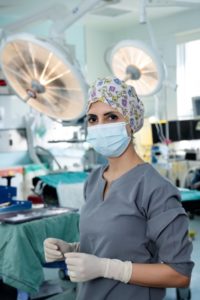Professor Asma Khalil
Professor Asma Khalil features in two episodes of Baby Surgeons: Delivering Miracles.
As well as her Professor of Obstetrics and Maternal Fetal Medicine role, she is the Obstetric Lead of the National Maternity and Perinatal Audit. She also leads our twin and multiple pregnancy service and set up our world-first Twins Centre for Research and Clinical Excellence at St George’s.
She has a keen interest in research and is passionate about innovation having pioneered the HSJ Award winning app HAMPTON which enables pregnant women to monitor their blood pressure safely at home.
Here, we catch up with her…
What made you want to get into this area of medicine?
The concept of ‘life before birth’. I was inspired by Professor Charles Rodeck, one of the fathers of fetal medicine, after I saw him giving a blood transfusion to a fetus inside the womb and I was fascinated. I went home and told everyone ‘I saw a miracle today’ I never forgot that day!
How did you find filming for Baby Surgeons: Delivering Miracles?
I really enjoyed it. Working with the production team was great. I was fascinated how they transformed what is my daily job into an amazing human journey for every patient. They really cared about the parents and babies – it was clear it wasn’t just a job for them, they really cared and interacted with all the team, respected the parents’ confidentiality and choice. They became members of our team!
What has been your favourite part of being involved with Baby Surgeons?
Sharing the filming experience with my patients added another dimension to the doctor-patient relationship. It was like ‘we are doing it together’. It also made me appreciate even more the human story behind every mother and every pregnancy.
Why did you want to be a part of this series?
Most people have never heard of fetal medicine. When I say I am a fetal medicine specialist, 9 out of 10 will look puzzled, as if to say ‘what does this mean?’ So I have to explain to them exactly what I do every day.
The impression I got from talking to patients is that they want to share their experience with the wider public, and it was my role to help them achieve this in a supportive way through the series.
How did you find the last year treating patients in a new covid-19 world?
It was a tough year for everyone; both the patients and healthcare professionals.
I vividly recall looking after a pregnant woman who had severe COVID and was admitted to the Intensive Care Unit. She didn’t speak much English, but every time I went to see her, she looked at me and asked “Am I going to die, doctor?” I had never been in this situation before; I wasn’t sure what to say, but I told her that “No, you will not. I will not let you die. Promise. You will get better and meet your beautiful twins.” She did recover and when I bumped into her a few weeks later, she gave me the biggest smile ever!
What would you say to someone who is interested in progressing into a similar career?
I’d definitely recommend – it’s the best job ever! Saving mothers’ and babies’ lives; what could be better?!


